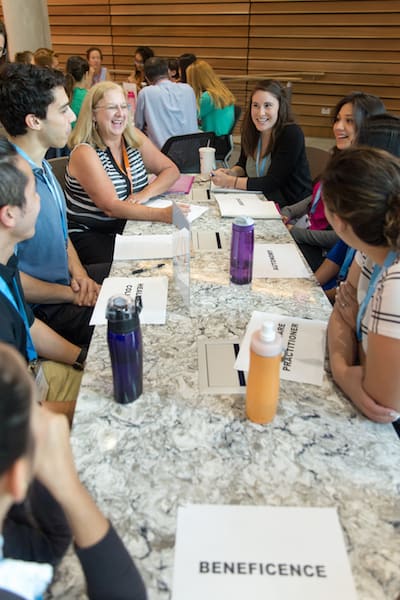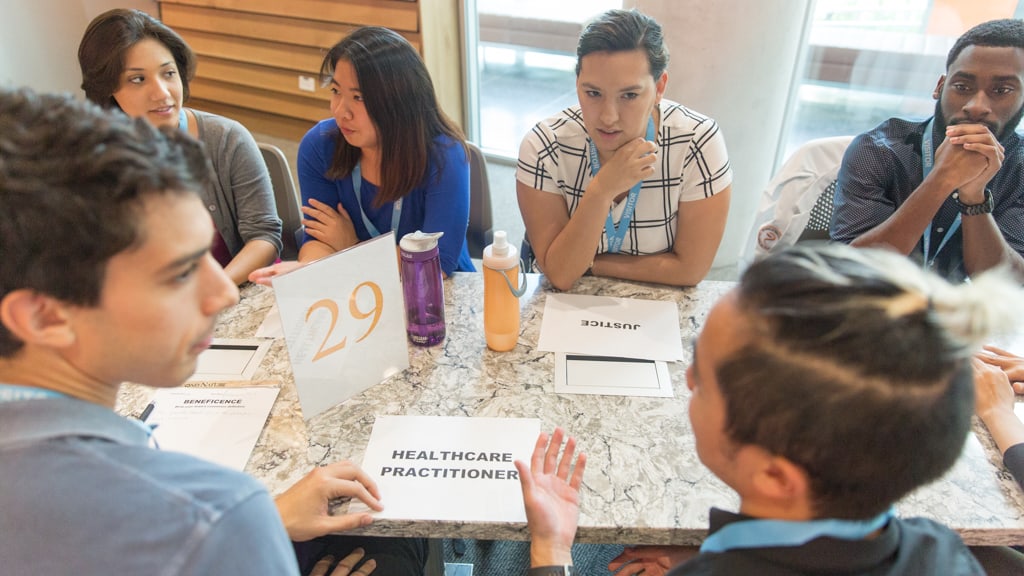The University of Texas at Austin has launched an innovative, year-long course that brings together faculty and students from the School of Social Work, Dell Medical School, School of Nursing, and College of Pharmacy.

During the course, “Foundations for Interprofessional Collaborative Practice,” faculty from the different units take turns leading sessions, and students work in teams to improve communication and collaboration across their respective professions with the ultimate goal of delivering safe, optimal, and patient-centered care.
“This is an exciting opportunity to bring together 260 learners and over 40 faculty members to learn from, with, and about each other in teams to improve patient care,” says Barbara Jones, associate dean for health affairs at the School of Social Work. “We believe that, together, we can create the interprofessional patient-centered care teams of the future.”
Jones spearheaded interprofessional education at the School of Social Work in 2012, when she developed an elective course for medicine and social work students with Dr. John Luk, from The University of Texas Medical Branch.
Kristi Fogle and Sandra Pruneda are among the 41 social work students who enrolled in the course in Fall 2016. Fogle is in the Administration and Policy Practice concentration, and hopes to intern at the Texas Legislature in spring of 2017. Pruneda, who has a bachelor’s degree in psychology, is in the Clinical Social Work concentration and is interested in working in the medical field. Next year she will be at MD Anderson Cancer Center in Houston for her final field placement.
We talked with both of them about their experiences in the course.
How would you describe this course?
Fogle: It’s a lot of group discussions and working together, along with gaining medical information, learning about each others’ professions and working as a team.
Pruneda: It is a course aimed at engaging different professions within the healthcare field. We learn how to interact, collaborate and develop good teamwork in order to improve patient health outcomes.
What are the benefits of an interprofessional class?
Fogle: It has been beneficial to learn about the different mindset that professionals from other disciplines have. Also, learning how to use my voice as a social worker and not be intimidated by the fact that there is a doctor or pharmacist in the room. Each of us play a crucial part in the puzzle.
Pruneda: It’s one of a few classes that allow you to learn in a setting that offers different perspectives. In the School of Social Work there’s a lot of diversity, but we are all learning the same things and have same principles. This class offers a more realistic representation of the diversity we will encounter in the workplace.
What course activities have you found most useful?
Fogle: So far, the case vignettes. We went through real-world scenarios as an inter-professional group, and this helped all of us learn more about each profession and explore the roles that we will be playing in the workplace. With case vignettes we are able to bring different knowledge, experience, and perspectives to the table and find meaning and value in everybody’s contribution to the team, all while determining the best line of action for the clients we serve.
Sandra Pruneda: I enjoyed the case study we did during our first cohort meeting. The professors presented a patient scenario and we had to respond to it as a team. The case changed and developed depending on our decisions and reactions. I think it was the most “real world” focused activity so far. It placed us out of our comfort zones and into different roles before we even had the opportunity to get to know each other. It really simulated how in the real world you won’t always know your colleagues, but you’ll be expected to work with them.
How does this class prepare you for your career as a social worker?
Fogle: This class gave me the opportunity to sit at the table with other professions and find my voice as a social worker in a setting where I have to advocate not only for my clients but for the social work profession as well. As someone interested in going into public policy, this is important because many times I will be the only social worker at the table. This class gave the opportunity to find my voice as social worker before I go into the workforce.
Pruneda: This class has empowered me as a social worker, given me tools for working with other health professions, and helped me learn to advocate for myself. This is all very useful as I get ready to go into health social work. For example, now I know that the best practice for working with doctors is to be familiar with the patient’s disease or condition and be aware of the prescriptions and side effects. By being very educated on these issues, you can advocate better and show the team the value of having a social worker.
Text and photos by Shelby Knowles. Posted January 3, 2017.


